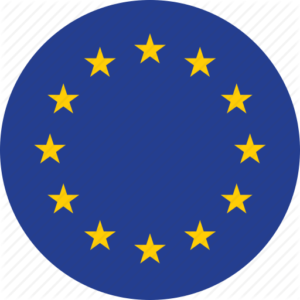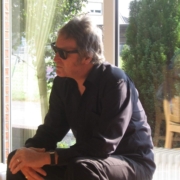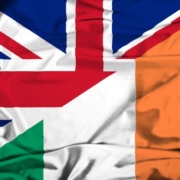Why I am a European
Why I am a European by Oliver Gray
My father was a linguist and used his skills in the Intelligence Corps during the war to help defeat the Nazis. I was born in 1948 and from quite a young age, I always remember meeting people from other European countries. My mother had taken in Polish refugees in Scotland during the war and I remember a particular friend of my parents called Oki, who owned a Polish restaurant in London where we would occasionally go. He gifted me a set of Russian dolls which I found completely fascinating.
When we moved to the Cotswolds when I was four, various neighbours had au pairs from Switzerland, France, Austria and Germany. We couldn’t afford au pairs but somehow they gravitated to our house, possibly because Father could speak to them in their languages. This meant that my parents made many much-loved friends in Europe, even though they didn’t travel much themselves, and these lovely people would always visit us when passing and send us Christmas gifts.
When I started secondary school, I was mediocre in most subjects but immediately took to languages. I have a very strong memory of my French teacher, whose nickname was Prune. He would write declensions and conjugations on the blackboard at extraordinary speed and it was noticeable that I enjoyed copying then down and learning them while most of my classmates didn’t. As soon as it was possible to take up a second language, I opted for German and immediately realised that I would be destined to do something with this language in my adult life. There was something so orderly, respectable and logical about the language and I loved it even when I had to move to a different teacher, a tiny gentleman call Willie Waters who shared Prune’s lightning blackboard skills but had a short temper. I just found it easy and very satisfying to make progress, even through the A-levels which entailed painstaking word-by-word analysis of extremely tedious works by Goethe and Schiller.
In my mid-teens, Father took me to France with the intention of encouraging my linguistic tendencies. We stayed in a small hotel in a town called Mantes-La-Jolie outside Paris, where I was supposed to make friends with the proprietor’s son. I actually didn’t get on particularly well with him but was completely entranced by the other-worldliness of this country with its different architecture, customs and cuisine. Later on, I was sent on a summer course in Tours in the Loire valley, where I got my first minor taste of an adult experience, meeting people from a range of different countries. I stayed with a sweet family who were incredibly kind and generous to me in every way. This was where I learnt to be consistently outward-looking throughout my entire adult life. Although I happen by chance to have been born British, I have never had nationalistic feelings at all. Having been privileged to travel so much, I just adore the various cultures.
The following summer brought a completely life-changing exchange visit to a small town called Schöningen, right on the East German border. I was able to see the armed DDR guards and the border wall at close hand and form the clear opinion that cutting oneself off from other countries for ideological reasons was a terrible, inhuman thing to do. The way I was welcomed in Schöningen was absolutely wonderful. Everybody was bursting with hospitality and friendliness and I made numerous lifelong friendships with people like Detlev, Brigitte, Christa and Knut. Of course I ended up studying languages at university, where many of the lecturers were from France or Germany. The course was actually called European studies, a very early example of such a concept, and more and more I came to feel more European than British. This was solidified during the most fantastic ‘year abroad’ in the Baltic sea port of Kiel, where I made yet more lifetime friends like Jochen, Ilse and Albrecht. I loved it so much that I went there for another year after completing my degree.
I very much wanted to stay on but this was in pre-EU days and my qualifications wouldn’t have been recognised. Therefore I returned to the UK to do a PGCE teaching certificate and, as soon as that was completed, hightailed it back to Germany, where I was privileged to teach English for three years in a state grammar school. Once again, the way I was received was full of warmth and hospitality. I have to say I loved every minute of it and have remained close friends with colleagues and ex-pupils – in fact so close that I ended up marrying one particular ex-pupil nearly forty years ago. During this period, a colleague and I spent each holiday hitch-hiking round Europe, visiting a total of nine countries and marvelling at our freedom to do so without hindrance. The only exception was Berlin, where my (now) wife and I had to split up and use different ways into the East, because she was German and I was English. Never in a million years would we have dreamt that, forty years later, an extremist regime would once again inflict this indignity on us, and that that regime would be a British one.
I was now intending to make my life and career in this very orderly and friendly society, but at the end of the three years, a political situation grew up and, even though by then we had entered the EU, it was possible for the authorities to terminate my contract and hand it to a German national. Not even thousands of people protesting on the streets were able to change this, and a return to the UK was the only option.
Back in the UK, I landed on my feet in a major way by ending up in a school whose head teacher was a linguist who was utterly committed to the European ideal. Languages were a very important part of the curriculum and for over twenty years I taught in that comprehensive school where all the pupils were very open-minded and there was never the slightest trace of any anti-European feelings. Part of my duties entailed taking annual exchange visits to Germany, and to this day I regularly get ex-pupils telling me that it was one of the most important events of their young lives. We even took a large group to Paris each year and their wide eyes and smiles showed how much they enjoyed and appreciated being exposed to a new culture. I was able to spend a blissful term teaching in a secondary school in France on an EU-organised teacher exchange programme. There I had the same experience as when I taught in Germany: well-behaved, polite and enthusiastic pupils, unhindered by things such as ridiculous uniforms and an excellent social mix, because private, fee-paying schools are almost unknown. There was a great international mix, too, with a good proportion of Portuguese and North African pupils, all speaking perfect French.
Eventually, I quit teaching because my little publishing company had become quite successful. Every single aspect of that company was European, creating reading, listening and speaking resources that enabled so many ex-pupils again to tell me, when I met them in the street, how they were able to communicate on holiday and how much they adored visiting various European countries and being part of them, because of course by then the UK was a full member of the EU. Naturally, both our children are bilingual and massive fans of everything European, particularly their German family and French food!
I know a certain amount about the culture of most European countries but I know most about Germany. What sets that country apart from the UK is that it’s an almost entirely egalitarian society, structured so that few people earn vastly more than others, and there’s a very strong sense of social responsibility in matters such as the environment and education. The gigantic social gaps that are found in this country don’t exist in the same way, and there’s very little in the way of what we know as our class system. No wonder, then, that I am attracted to that kind of society and repelled by the kind of government this country currently has in place, presiding internally over obscene inequality and externally over policies of isolationism and xenophobia.
At the moment, of course, people are naturally concerned about the effects of Brexit on the level of the economy and their personal day-to-day well-being, worried about food shortages, increased bureaucracy, transport issues, pet passports and goodness knows what else. Of course I am worried about these things too, but I hope I have shown above that the most hateful aspect of Brexit is the arrogance and snobbishness that looks down its nose at foreigners. If any Brexiteer tells you “I’m not a racist”, it’s almost certain that he or she is lying or self-delusional. Go on any forum and ask them to explain what advantages will be gained from Brexit and they are completely incapable of coming up with any, other than meaningless platitudes about “sovereignty”, which they can’t explain. It’s nationalism, plain and simple. They are perfectly happy to be ruled over by unelected bureaucrats, as long as they are British unelected bureaucrats. They have no problem at all with the House Of Lords and the Monarchy so yes, they are racist, even though they may not recognise it in themselves. So, for me, it’s all on a personal level rather than a macro-level, and I was casting around to find some sentences to express my feelings when I came across a comment on a Facebook forum that did it for me. I have copied it and reproduce it here now:
“It’s so sad that Brexiteers never saw that the EU was about people, to give them as many freedoms and rights as possible, to live, work and love freely in any EU nation. The EU is far more than just trade. It’s about its people’s lives, and how they want to live. Brexit has taken away all this from us, and given us absolutely nothing in return”.
And this is it for me. It’s about people, human interactions and civilized, open-minded behaviour. People who go on about nebulous concepts such as sovereignty are comparable in my mind to religious fanatics, in that they are committed to believing in something that doesn’t actually exist.
One thing I struggle with is that I believe in tolerance and understanding and reaching out to others. This was a hallmark of my Sixties generation, so it’s particularly horrifying to note that people of my generation, whose parents, like my father, fought for the chance to remove animosity from Europe, now display exactly such animosity. Logically, my policy of tolerance should make me feel warm towards Brexit supporters and forgive them for what they have done. This is where I realize that I am a much harder person then I thought I was. These people have deliberately inflicted pain, inconvenience and cruelty on other human beings for no logical reason, and for that I will never forgive them.





